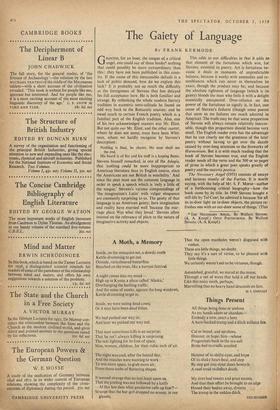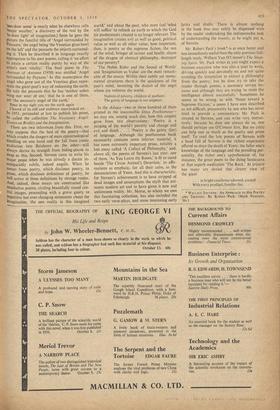The Gaiety of Language
BY FRANK KERMODE GRANTED, for an hour, the tongue of a critical angel, one could say of these books* nothing that could possibly be more extraordinary than this : they have not been published in this coun- try. If the cause of this inexcusable default is a lack of public demand, how do we explain this lack? It is probably not so much the difficulty as the foreignness of Stevens that has delayed his full acceptance here. He is both familiar and strange. By rethinking the whole modern literary tradition in eccentric semi-solitude he found an odd way back to the Romantic sources; and he owed much to certain French poetry which is a familiar part of the English tradition. Also, one of his two acknowledged masters was Mr. Eliot. But not quite our Mr. Eliot; and the other master, whom he does not name, must have been Whit- man, whom we hardly recognise by Stevens's description :
Nothing is final, he chants. No man shall see the end.
His heard is of fire and his staff is a leaping flame. Stevens himself remarked, in one of the Adagio, that 'nothing could be more inappropriate to American literature than its English source, since the Americans are not British in sensibility.' And since the poet must use the common language in order to speak a speech which is 'only a little of the tongue,' Stevens's various compoundings of 'the imagination's Latin' with vulgar eloquence are constantly surprising to us. The gaiety of that language is an American gaiety; here imagination and reality have married well 'because the mar- riage place Was what they loved.' Stevens often insisted on the relevance of place to the nature of imaginative activity and objects. This adds to our difficulties in that it adds to that element of the fortuitous which was, for Stevens, essential to poetry. Art is fortuitous be- cause it deals in moments of unpredictable balance, because it works with anomalies and re- semblances which can never in themselves be exact, though the product may be; and because the absolute rightness of language (which is its gaiety) bloods the man who feels it with a delight essentially unexpected. Over-reliance on the power of the fortuitous to signify is, in fact, one cause of Stevens's failures (though some poems that seem to me failures are much admired in America). The truth may be that some proportion of Stevens will always remain relatively inacces- sible, though this proportion should become very small. The English reader even has the advantage that he can clearly see the greatness of the later poetry without having to get over the dazzle caused by over-long attention to the fireworks of Harmonium. But it is with much reading that the book of Stevens becomes true, and the English reader needs all the verse and the 300 or so pages of prose in which a great poet speaks greatly of poetry and the materia poetica.
The Necessary Angel (1951) consists of essays and lectures mostly of the Forties. It is worth saying, with the help of Mr. S. F. Morse—author of a forthcoming critical biography—how the book came by its title. In 1949 Stevens bought a still-life by Tal Coat; he admired it because 'for all its in-door light on in-door objects, the picture re- freshes one with an out-door sense of things.' (This * THE NECESSARY ANGEL. By Wallace Stevens. (A. A. Knopf.) Oros POSTHUMOUS. By Wallace Stevens. (A. A. Knopf.) :out-door sense' is nearly what he elsewhere calls ,Major weather,' a discovery of the real by the in-door light' of imagination.) Soon he gave the picture the fanciful title of 'Angel surrounded by Peasants,' the angel being 'the Venetian glass bowl On the left' and the peasants the objects surround- ing it. Then he described it in language exactly appropriate to his own poems, calling it 'an effort to attain a certain reality purely by way of the artist's own vitality.' The final poem in The Auroras of Autumn (1950) was entitled 'Angel surrounded by Paysans.' In this masterpiece the angel who grew out of the Venetian glass repre- sents the giant-poet's way of redeeming the earth. lie tells the peasants that he has 'neither ashen wing nor wear of ore,' that he is one of them, yet 'the necessary angel of the earth,' Since in my sight you see the earth again Cleared of its stiff and stubborn man-locked set. In 1951, persuaded at last to publish his prose, he .called the collection The Necessary Angel: Essays on Reality and the Imagination.
There are two inferences from this. First, we may suppose that the best of the poetry—that Which evades the dangers of mere epistemological doodling on one hand and the fall from ironic exaltation into flatulence on the other—will always derive its strength from hiding-places as deep as this. Second, Stevens came to write his Major prose when he was already a doctor in- comparably subtle, indeed angelic. When he comes from poetry, which discloses poetry, to Prose, which discloses definitions of poetry, he will arrive at these definitions by strange routes. And, indeed, these essays are constructed like meditative poems, circling beautifully round cen- tral images, proceeding with a grave gaiety to repetitive but ever-changing statements about the imagination, 'the one reality in this imagined world,' and about the poet, who must find 'what will suffice' to refresh an earth to which the God his predecessors created is no longer relevant. The imagination creates evil as well as good, political value as well as all other value; how important, then, is poetry as the supreme fiction, the sun of the mind, bringer of savour and health, slayer of the dragon of abstract philosophy, destroyer of our poverty?
'The Noble Rider and the Sound of Words' and 'Imagination as Value' are the most remark- able of the essays. Within their subtle yet monu- mental structures there is the quickness of the poet's mind, inventing the dialect of the angel whose joy redeems the world.
Natives of poverty, children of malheur, The gaiety of language is our seigneur.
In the Adagia—two or three hundred of them printed in the inaccessible Opus Posthumous— we may see, among much else, how this couplet grew from two observations ; 'Poetry is a purging of the world's poverty and change and evil and death . . .'; `Poetry is the gaiety (joy) of language.' Although the posthumous book necessarily contains some inferior material, it has some extremely important prose, notably a late essay called 'A Collect of Philosophy,' and, above all, the poems of Stevens's last year; one of them, 'As You Leave the Room,' is fit to stand beside 'The Circus Animal's Desertion,' its affir- mations as emphatic, for all their calm, as the denunciations of Yeats. And this is characteristic, for Stevens's achievement is to have stripped of dead images and assumptions the myth that ani- mates modern art and to have given it new and unforeseen reality. Mr. Morse, to whom we owe this fascinating collection, has also included the two early verse-plays, and some interesting early lyrics and drafts. There is almost nothing in the book that may safely be dispensed with by the reader undertaking the indispensable task of understanding the /nuncio, as he might put it of Stevens.
Mr. Robert Pack's book* is at once better and less immediately useful than the only previous full- length study, William Van O'Connor's The Shap- ing Spirit. Mr. Pack writes as you might expect a business executive who was also ,a poet to write, driving quickly and devotedly on and not quite avoiding the temptation to extract a philosophy from the poetry; but he does try to take the reader through poems, a necessary service be- cause and although they are trying `to resist the intelligence almost successfully.' Sometimes he seems to be wrong, as with 'Notes toward .a Supreme Fiction,' a poem I have seen described as not difficult, presumably by one who has never tried to provide a commentary. Mr. Pack is. steeped in Stevens, and can write very instruc- tively; because he does not always do so, one should perhaps use O'Connor first. But no critic- can help one as much as the poetry and prose itself. To read the late poems of Stevens with a head full of Stevens is the richest experience offered us since the death of Yeats; the fuller one's- knowledge of the language and the presiding per sonality, the richer one's apprehension of, for instance, the great poem to the dying Santayana or that superb meditation 'The Rock.' At present too many are denied this clearer view of the giant . . . in bright excellence adorned, crested With every prodigal, familiar fire.
* WALLACE STEVENS : AN APPROACH TO HIS POETRY AND Tnouctrr. By Robert Pack. (Mark Paterson. 36s.)



















































 Previous page
Previous page